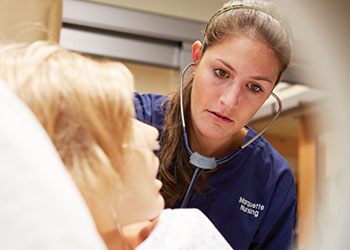We have many students who commute to our program from Wisconsin and Northern Illinois. We attempt to place student near their homes for clinical when possible. Generally some commuting for clinicals should be expected because we want students to experience a variety of clinical settings during the Nurse-Midwifery Program (NMP).
The NMP is hybrid-online. This means that each of the midwifery specialty courses includes both in-class and asynchronous internet-based interactions among faculty and students. The midwifery courses are scheduled on campus up to eight times a semester, depending on the course. There are also many clinical hours that occur in the mixed didactic and practicum courses in the NMP. Generally, the nurse-midwifery specialty coursework is completed online on a weekly basis, with required readings. Marquette's e-Learning application is Desire2Learn (D2L), a web-based tool which facilitates and supports online education. Online learning software allows you to remain at home, access course materials, and interact with your classmates and professors via web-based classroom discussions in an easy-to-use format.
The Nurse-Midwifery Program also includes eight core and foundational M.S.N. courses and six nurse-midwifery specialty courses. Some of the core and foundational courses are also hybrid online. Each course at Marquette has its own D2L course site with facilities for interactive communication, secure submission of student assignments to faculty. Easy reference to all their course materials is a common positive expressed by students when working online.
